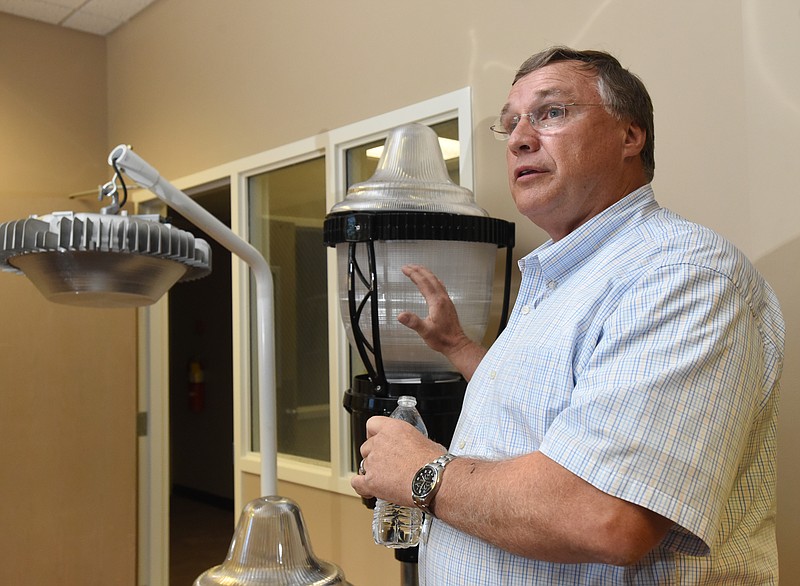A Hamilton County judge has dismissed a lawsuit filed by a Chattanooga lighting company that charged the city and EPB conspired to block implementation of a new energy-efficient street lighting system because it threatened EPB's telecommunications model.
Circuit Court Judge J.B. Bennett ruled that the lawsuit as originally filed and later amended by Global Green Lighting (GGL) and its owner, Don Lepard, was not based upon appropriate claims against a municipality and public officials. But Bennett gave the plaintiffs 30 days to submit a new lawsuit and told GGL attorney Buddy Presley to meet with city and EPB officials to discuss the dispute and to help ensure any other lawsuits that Lepard might file would be properly entered for court consideration.
Global Green Lighting supplied thousands of energy-efficient streetlights in Chattanooga under a contract negotiated by former Mayor Ron Littlefield. But Mayor Andy Berke, who was elected in 2013 to succeed Littlefield, initially limited the GGL contract four years ago and then terminated it altogether last year when the city and EPB said too many of the lights failed to work as promised and the cost of the streetlighting program was more than what Berke wanted to spend.
Lepard said he sought to correct faults with the lights and radio controls when he was under contract with the city even though some of the failures were due to installation problems by EPB subcontractors.
The GGL founder insists his LED lighting system is more energy efficient and offers control capabilities that would help the city adjust its lighting and better fight crime.
But the city and EPB are no longer trying to use the adjustable controls and lighting features on the 4,600 streetlights Global Green Lighting installed before the company's contract was terminated.
"Judge Bennett recognize the merit of what we said and, for the first time in three years, ordered the EPB, Mr. DePriest and Mr. Berke to sit down with us and try to reach a settlement," Presley said in a statement after the court hearing this week. "To focus on the dismissals is to miss the point. The judge said GGL could refile the lawsuit if no settlement is reached. Given the history of GGL with the defendants, this is a significant step forward for Don in his attempt to right a wrong."
Bennett accepted the motion of the defendants to dismiss Lepard's lawsuit rather than to allow a third amendment to the pleading as the plaintiff had requested. But Bennett told Lepard at the end of the hearing that, "It looks like you get to live to fight another day," according to those at the Wednesday hearing.
The dismissal marks the second time Lepard's claims against the city and EPB have been rejected on procedural grounds in Hamilton County Circuit Court.
In September 2015, Hamilton County Circuit Court Judge Jeff Hollingsworth dismissed a previous lawsuit by Lepard and GGL against against EPB seeking to recover what he says were overcharges to the city of Chattanooga for the utility's mismanagement of Chattanooga's street lights program. Hollingsworth ruled that EPB could not be sued on behalf of the city because EPB and the city of Chattanooga are legally the same identity.
"We knew from the start that there was no legal basis for any of these claims," EPB spokesman John Pless said in a statement after Bennett's ruling. "We are pleased that the court has once again agreed by granting our motions for dismissal."
In his original 24-page complaint filed in March - and again in a 68-page complaint entered in April - Presley said EPB sought to block GGL's metered, LED lighting system because it threatened to expose billing mistakes in the past by EPB and undermine EPB's $220 million fiber optic, smart grid by offering another, cheaper alternative.
GGL said through its work it discovered that EPB had improperly classified 10,604 lights and overcharged the city for years as a result.
The court never considered the merits of GGL's claims against the city and EPB because both of the company's lawsuits were rejected in summary judgments because the claims were ruled out of order for a lawsuit against a municipality.
EPB Attorney Rick Hitchcock said the lawsuit was "incoherent, rambling and devoid of any merit."
Bennett also said Global Green Lighting will likely have to pay the attorneys' fees for both Berke and former EPB President Harold DePriest, who GGL also sued as individuals for their role in terminating the street light contract.
Contact Dave Flessner at dflessner@timesfreepress.com or at 423-757-6340.
